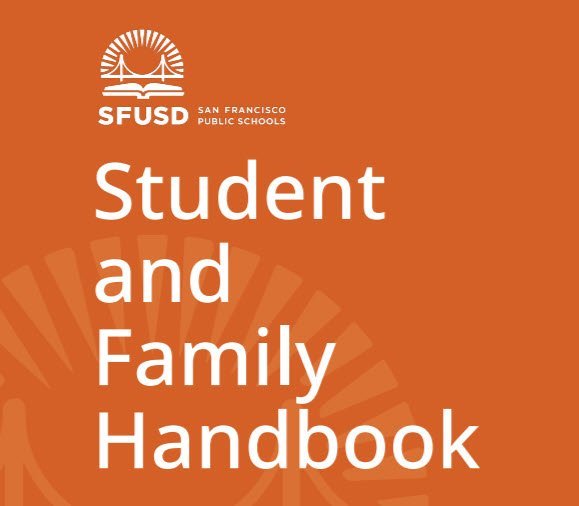TDAP Requirement
If your child is entering grade 7 in the fall, or is new to California and is in grade 7-12, a California school immunization law (AB 354) requires your child to have proof of a whooping cough booster shot (also called Tdap) in order to attend school.
Si su hijo está por ingresar en el otoño al 7º grado, o ingresará por primera vez al Distrito Escolar al grado 7º, 8º, 9º, 10º, 11º o 12º, la ley escolar de California requiere que su hijo compruebe que recibió la vacuna de refuerzo contra la tos ferina (también conocida como Tdap), para poder asistir a la escuela.
根據加州一項學校疫苗接種法例(AB 354 ),所有在今秋升讀7年級,或是第一年入讀三藩 市聯合校區7-12年級的學童必須在入學前提交破傷風白喉百日咳混合疫苗 (簡稱 Tdap) 加 強劑之注射證明。
Safety Tips
Below are a few tips for talking with your child about prevention and staying safe.
-
When possible, walk in pairs or groups.
-
Make sure parents/guardians know where children are, where they are going and who they are with.
-
If your child needs to walk alone, tell them to be VERY aware of their surroundings. NO earbuds or distractions. If a car is driving by slowly, stay away from the sidewalk.
-
Do not talk to adults they don't know, especially if the adult is in a car.
-
If someone approaches your child or touches them without permission, tell them to scream or yell loudly using words like "no", "help", etc. to make it clear they need help. YES, It is okay to fight back physically in these situations.
Useful Articles From Parents Section of KIDSHEALTH.ORG
10 Ways to Help Your Child Succeed in Middle School
Parental support plays an important part in helping preteens and teens succeed in middle school. But as students grow more independent during these years, it can be hard for parents to know which situations call for involvement and which call for a more behind-the-scenes approach. Read the article.
Getting Involved at Your Child's School
Even if you haven't been involved in the past, it's never too late to start. In fact, it may be more important than ever to get involved when kids reach secondary school. Some parents may experience "volunteer burnout" by the time their kids enter high school or decide that the schools don't need them as much then. Many parents who volunteered a lot of time during their kids' elementary years return to full-time careers by the time their kids are teens, so there's often a shortage in the secondary schools. Read the article.
Community Service: A Family's Guide to Getting Involved
It's easy to feel disconnected, as many parents juggle work, school, kids, and activity after activity. But some simple things can bring a family closer — playing a game, going for a hike, or cooking a meal together.
One of the most satisfying, fun, and productive ways to unite is volunteering for community service projects. Volunteerism also sets a good example for your kids and helps the community. Read the article.
Parent-Teacher Conferences
Kids and teens do better in school when parents are involved in their academic lives. Attending parent–teacher conferences is a way to be involved and help your child succeed.
A parent–teacher conference is a great opportunity to:
- start or continue ongoing conversations with your child's teacher
- learn how to help your kids do their best in school
- let your child know that what goes on in school will be shared at home
About KidsHealth
If you're looking for information you can trust about kids and teens that's free of "doctor speak," you've come to the right place. KidsHealth is the most-visited site on the Web for information about health, behavior, and development from before birth through the teen years.
On a typical weekday, KidsHealth gets as many as a million visits. One of the things that make KidsHealth special is that it's really four sites in one: with sections for parents, for kids, for teens, and for educators.
KidsHealth is more than just the facts about health. As part of The Nemours Foundation's Center for Children's Health Media, KidsHealth also provides families with perspective, advice, and comfort about a wide range of physical, emotional, and behavioral issues that affect children and teens. Find out more.
Top 15 Things your Middle School Kid Wishes You Knew
1. Respect me. I'm my own person, not just your kid. sometimes I might have opinions that differ from yours. Sometimes I just want to be your baby. Respect me either way.
6. It feels really good when you ask me to teach you about what I'm learning or what I'm good at. You don't have to be awesome at computer programming to let me teach you some cool stuff, for instance. I have to be a beginner constantly. Show me it's OK to stay relaxed and present when you are struggling to learn something.
9. Sometimes I am completely overwhelmed and need to zone out for a while. I am not becoming a slug and will not stay in my room staring at a screen for the rest of my life. Maybe just for the rest of the afternoon.
10. I will fight you every step of the way if you make me do stuff I don't want to do (get some exercise, do my homework, write a thank-you note, practice piano, apologize to my sister, take a shower, wear deodorant... so many things), but you should probably make me do them anyway. I know I will fell better if I sweat and shower each day, and develop my study skills, and show up tomorrow prepared, and, and, and. I know! But please don't overwhelm me. I might not be able to do what I should right away. I might need reminders, later, which will annoy me completely. Remind me anyway.
Click to read the other 11 things
This page was last updated on December 16, 2021



